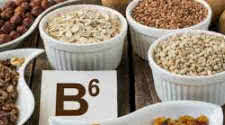Vitamin B6 - Muscle Building Benefits for Weight Training Athletes

Effects and Benefits of Vitamins Discussed
Sometimes it's a bad idea to mess with Mother Nature. Take a healthy food like corn, for example. It's rich in dietary fiber, vitamin E and other nutrients and
has been an important part of the diets of many populations. On the other hand, if you take the corn that Mother Nature gave us, squeeze the oil out of it and
then chemically hydrogenate it so it becomes hardened, you have a widely used food called margarine that has been implicated as a cause of heart disease due to
its content of so-called trans-fatty acid.
Then there's the soybean, a nutritional powerhouse. If you squeeze the oil out of it, then chemically alter it so the human body cannot absorb it, you get a
chemically engineered food that tastes and feels like fat bulls calorie-free. It sounds like a miracle, but Olean, as it's called, causes severe diarrhea in a
small percentage of people, and there's even greater concern about its effect on the fat-soluble vitamins A, D and E.
Since Olean isn't absorbed, neither are any of the fat-soluble vitamins that are consumed at the same meal, which can lead to deficiencies. A third example of
the trashing of Mother Nature's creations is the wheat kernel. Casting off the germ and the bran so that only the starch is left is the way we get white flour,
white bread and white-flour-based baked goods.
We do it because such products don't spoil as quickly on the shelf and because the soft texture appeals to most of the public. The problem is, they're so devoid
of food value that they have to be fortified with vitamins and minerals by the manufacturer— according to government guidelines—to have any value at all.
One nutrient that's removed and not put back in the making of white flour is vitamin Us, or pyridoxine. Consequently, athletes as well as the general public,
most of whom consume a highly refined diet, may be pyridoxine deficient.
Vitamin B6 is necessary for protein metabolism and for fuel metabolism during exercise. What's more, recent research reveals it to be one of the important nutrients
in controlling homocysteine in the body, helping keep it below artery-damaging levels. The lesson here is that lie is important to everyone and that tampering with
foods as nature intended them can result in dire consequences.
Even so, vitamin B6's benefits don't stop there, as it has a special bonus for bodybuilders. Taken at higher levels and combined with exercise. B6 can increase
growth hormone levels. In one study researchers infused 600 milligrams of vitamin B6 or a placebo into six subjects, who then exercised on a bicycle for eight
minutes at 80 percent of maximum heart rate. Plasma growth hormone levels were significantly in crease in the vitamin B6 group over the placebo group for up to
60 minutes after exercise. The researchers repeated the study and got the same results.
Since most people aren't able to have infusions— meaning intravenous delivery—of B6 during exercise, researchers studied the effect of oral supplementation. Once
again the subjects were male cyclists, and in this case they exercised to exhaustion. One group received a placebo, while the others took 22.3 milligrams of B6 per
day (the recommended daily allowance is two milligrams) for 24 days prior to the exercise test. Exercise by itself increased growth hormone by 28 n mol/l, while
exercise plus the B6 increased it by 36 n mol/l.
How much B6 should you take to increase your growth hormone levels? An obvious starting dose would be something like what the subjects took in the above study,
around 20 to 25 milligrams and plan to take it for close to a month before you see any significant results. It's not a good idea to take larger amounts of B6
orally; for example, amounts as great as the 600 milligrams that was used in the first study discussed.
A study that appeared in The American Journal of Clinical Nutrition reported that plasma levels of B6 plateau at 50 to 100 milligrams when taken orally. Thus,
any oral dose of more than 100 milligrams per day is essentially wasted. In addition, in the range of 1,000 to 3,000 milligrams have been found to cause temporary
nerve paralysis.
How does taking a simple vitamin increase growth hormone? Researchers think it's B6's ability to convert dopa to dopamine in the body.
So, if you're looking to build size by increasing growth hormone levels, consider B6 supplementation combined with intense bodybuilding workouts. You should also
increase your intake of B6-rich foods, including 100 percent whole-wheat bread; whole-grain cereals; legumes, such as beans, split peas and greens, such as spinach,
kale and turnip greens; and orange juice.